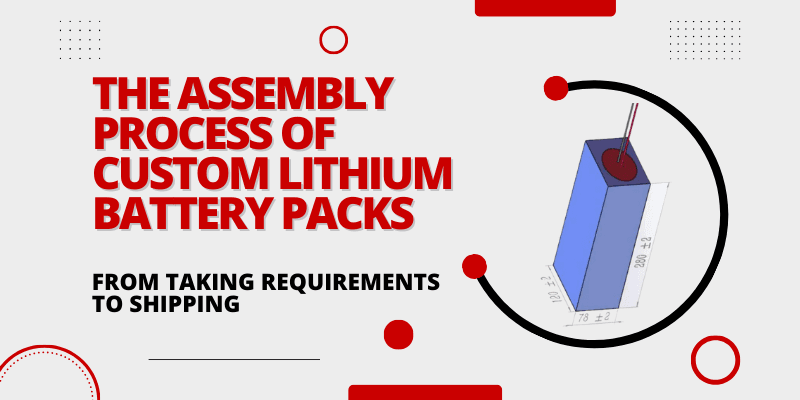
The Assembly Process of Custom Lithium Battery Packs
07 Feb 2024 | By: José González
In this article, we will delve into the detailed process of assembling custom lithium battery packs, addressing everything from the initial reception of customer requirements to the shipment of the final product. Every vital phase in the manufacturing of these packs will be meticulously explored. These components are fundamental in a variety of industrial and commercial applications, highlighting the importance of thoroughly understanding their production process. From material selection to quality controls, each step will be examined to reveal its contribution to the final outcome.
Index of contents
Introduction
Custom lithium battery packs represent an innovative energy solution that has revolutionized a wide range of industries and applications. In the modern era, where mobility, electrification and energy efficiency are key imperatives, these personalized packs have emerged as a fundamental piece in the convergence towards a more sustainable and technologically advanced future. Their versatility and adaptability make them indispensable in sectors ranging from automotive and consumer electronics to renewable energy and aerospace.
These battery packs are distinguished by their ability to be designed and configured according to the specific requirements of each client. From power capacity to voltage to physical form, these packs can be tailored to meet a wide variety of needs and applications. This flexibility makes them the preferred choice for a variety of projects, from energy storage systems for homes and businesses to electric mobility solutions for land, sea and air vehicles.
In the field of mobility, custom lithium battery packs have played a fundamental role in accelerating the transition to electric vehicles. From cars to electric bicycles and scooters, these packs offer a unique combination of energy density, light weight and fast charging capabilities, making them the ideal choice to power the next generation of clean and efficient vehicles.
In the industrial sector, these custom packs are essential for powering a variety of equipment and devices, from power tools to telecommunications equipment and power backup systems. Their ability to be engineered to exact customer specifications makes them ideal for a wide range of applications, from demanding environments to critical applications where reliability and durability are paramount.
In addition to their terrestrial applications, custom lithium battery packs also play an important role in aerospace and space exploration. Their ability to deliver high energy density and long life makes them the preferred choice for powering satellites, space probes and other devices in deep space, where reliability and performance are critical.
In short, custom lithium battery packs represent an innovative energy solution that is transforming the way we live, work and move. With their ability to adapt to a wide range of needs and applications, these customized packs are paving the way to a cleaner, more efficient and more sustainable future for everyone.
Reception of Client Requirements
The process begins with receipt of the client’s specific requirements. This may include data such as desired power capacity, voltage, physical pack size, safety requirements and more. It is crucial to fully understand the customer’s needs to ensure that the resulting battery pack meets all of their expectations and requirements. Clear and effective communication between the client and our team is essential in this initial stage of the assembly process.
During this phase, we strive to establish a strong relationship with the client, encouraging an open dialogue to fully understand their needs. We focus on asking the right questions to get a clear view of the project requirements. Additionally, we take every opportunity to offer expert guidance and suggestions that may improve the final battery pack design.
By fully understanding the client’s requirements from the beginning, we can avoid misunderstandings and ensure the end result meets your expectations. Continuous feedback and close collaboration with the client are key aspects of our approach, allowing us to adapt and adjust the design as necessary to achieve maximum client satisfaction.
Design and Planning of the Battery Pack
Once the requirements are received, our design and planning team works on creating a custom design for the battery pack. Aspects such as cell layout, electrical connection, thermal management and safety are considered.
During this phase, we use software specialized in battery design to model and visualize the proposed pack. Various configurations are examined to optimize energy efficiency and pack performance based on customer requirements.
In addition, we pay special attention to the safety of the design. Protection measures against overloads, short circuits and overheating are implemented to ensure user safety and prolong the life of the battery pack.
Our goal at this stage is to create a design that maximizes the capacity, durability and reliability of the battery pack, while meeting customer specifications and internal quality standards. Close collaboration between our design team and the client ensures that the final design meets all expectations and requirements.
Selection of Battery Cells and Components
With the design in place, we proceed to the selection of the battery cells and other necessary components. High quality cells are chosen and compatibility with the proposed design is ensured.
At this stage, we draw on our experience and knowledge in the industry to select the most suitable battery cells for the project at hand. There are several types of battery cells available on the market, each with its own characteristics and specific applications. Among the most common types are:
-
Lithium-ion (Li-ion) cells: These cells are widely used due to their high energy density, long life and low self-discharge rate. They are ideal for applications that require high energy density, such as portable electronic devices and electric vehicles.
-
Lithium polymer (LiPo) cells: These cells are similar to lithium-ion cells, but have a flatter and more flexible shape. They are ideal for devices that require a thin and light design, such as smartphones and tablets.
-
Lithium iron phosphate (LiFePO4) cells: These cells are known for their high thermal stability and ability to withstand a high discharge rate. They are ideal for applications that require high security and reliability, such as home energy storage systems and high-power electric vehicles.
-
Nickel-metal hydride (NiMH) cells: Although less common than lithium cells, NiMH cells are known for their high capacity and low cost. They are suitable for applications that require high energy storage capacity, such as power tools and medical devices.
We consider factors such as capacity, energy density, lifespan and discharge rate to select the most suitable type of battery cell for the project at hand.
In addition to battery cells, we also carefully select other necessary components, such as battery management system (BMS), connectors, cables and protection systems. We ensure that all components are of high quality and perfectly matched to the design of the battery pack.
Meticulous selection of battery cells and components is critical to the quality and performance of the final pack. We strive to guarantee the reliability and safety of the battery pack, choosing the best components available on the market and ensuring their compatibility with the previously established design.
Assembly and Manufacturing of the Pack
Battery pack assembly involves physically placing the cells in the arrangement specified by the design. Advanced welding and fixing techniques are used to ensure a secure and durable connection between cells and other components.
Our highly trained and experienced team carries out the assembly process with precision and attention to detail. Each battery cell is carefully placed in its designated position, following the previously established design to ensure uniform charge distribution and efficient thermal management.
During the assembly process, intermediate tests are performed to verify the integrity and function of each component. Special attention is paid to soldering and electrical connections to ensure quality and reliability.
Additionally, rigorous safety measures are applied to protect both personnel and product during the assembly process. Appropriate personal protective equipment is used and established safety protocols are followed to minimize the risk of accidents.
Once assembly is completed, the battery pack undergoes final testing to verify its operation and performance. Loading and unloading tests, as well as functional tests under simulated conditions, are performed to ensure that the pack meets all customer specifications and internal quality standards.
The assembly and manufacturing process of the battery pack is crucial to guarantee the quality and reliability of the final product. We are committed to maintaining the highest standards at every stage of the process to offer premium quality lithium battery packs to our customers.
Product Testing and Quality
Once assembled, the battery pack undergoes rigorous quality and performance testing. This includes capacity testing, charge and discharge testing, security testing, and more. Any defects or issues are addressed and corrected at this stage.
Capacity testing is performed to ensure that the battery pack meets the rated capacity specified by the customer. Specialized equipment is used to measure the actual capacity of the pack and ensure it is within acceptable limits.
Charge and discharge tests are essential to evaluate the performance of the battery pack under real use conditions. Repeated loading and unloading cycles are carried out to verify the stability and durability of the pack over time.
In addition to performance testing, safety testing is performed to ensure that the battery pack meets applicable safety standards. Overload resistance, short circuit protection and other potential risks are evaluated to ensure user safety and product integrity.
Any defects or issues identified during testing are addressed immediately. Adjustments and corrections are made as necessary to ensure the battery pack meets the highest quality standards.
Our commitment to quality and excellence drives us to conduct extensive testing on every battery pack we produce. We strive to offer the highest quality products that meet and exceed our customers’ expectations in terms of performance, reliability and safety.
Packaging and Shipping of the Pack
Finally, the assembled and tested battery pack is carefully packaged for shipment. Robust packaging materials are used and appropriate safety protocols are followed to ensure that the product reaches its final destination in perfect condition.
During the packaging process, we ensure that the battery pack is adequately protected against any possible damage during transportation. Strong, padded packaging materials are used to prevent shocks, vibrations or impacts that could affect the integrity of the product.
Additionally, applicable safety protocols and transportation regulations for shipping hazardous products, such as lithium batteries, are strictly followed. Packages are labeled correctly and the necessary documentation is provided to comply with all local and international regulations.
Once the battery pack is properly packaged and labeled, it is scheduled for shipment using reliable and safe transportation services. We make sure to coordinate delivery with the customer to ensure timely and smooth arrival.
With this, the custom lithium battery pack assembly process is complete! From receiving customer requirements to shipping the final product, each step is crucial to ensure quality and customer satisfaction. We strive to offer a comprehensive service that guarantees the delivery of the highest quality lithium battery packs to our customers at all times.
Rekoser is a manufacturer of custom lithium pack batteries, do not hesitate to contact us with any requirements you may have.
Subscribe
